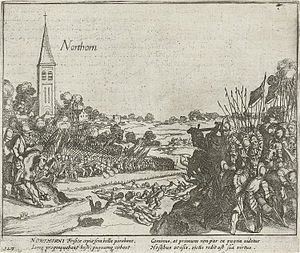Battle of Noordhorn
| Battle of Noordhorn | |||||||
|---|---|---|---|---|---|---|---|
| Part of the Eighty Years' War | |||||||
 The States' army in Noordhorn defeated by Verdugo, 1581. Simon Frisius, 1613–1615. |
|||||||
|
|||||||
| Belligerents | |||||||
|
|
|
||||||
| Commanders and leaders | |||||||
|
|
|
||||||
| Strength | |||||||
| Exact number unknown: 3 infantry regiments, 4 cavalry companies, no artillery |
3,000 infantry, 500 cavalry, 5 cannons | ||||||
| Casualties and losses | |||||||
| Unknown | 2,000 to 3,000 killed, 5 cannons | ||||||
The Battle of Noordhorn, fought on 30 September 1581, was a pitched battle of the Dutch Revolt, fought between a Spanish army commanded by Colonel Francisco Verdugo – consisting of Walloon, German, Spanish and Albanian soldiers – and a Dutch States rebel army under the Englishman John Norreys – comprising English, Scottish, Dutch and Walloon troops – in the province of Friesland. In 1580, the Dutch stadtholder of Friesland, George van Lalaing, Count of Rennenberg, had shifted its allegiance from the Dutch to the Spanish side. This opened a new front at the back door of the Dutch Republic, forcing the States-General to dispatch forces to the north. That year the Dutch, under the leadership of John Norreys, succeeded in relieving the town of Steenwijk. In July 1581, Rennenberg died and was replaced by the Spaniard Francisco Verdugo, whose arrival in Friesland with reinforcements changed the situation. On 30 September Verdugo forced Norreys to give battle using a strategy of attrition.
The battle was fought on a rough, marshy ground very favourable to the Spanish army. Norrey's initial assault on the Spanish right wing was successful, but the Spanish cavalry, led by Verdugo, routed the Dutch cavalry under William Louis, Count of Nassau-Dillenburg and broke the States' infantry. The English left was then cut off from the rest of the States' army and destroyed. During the pursuit of the States' troops Verdugo was nearly captured, but left unharmed in the end. Both Norreys and Count William Louis were wounded, and their army suffered a heavy death toll, losing many flags and all five of its guns. Verdugo could not capitalize on his victory because of a mutiny the following day by his German regiments and heavy flooding. The military situation in Friesland, however, had reached a turning point, and in 1582 the Spanish made great advances, even taking Steenwijk on 17 November 1582.
...
Wikipedia
